July 10th, 2012 by Dr. Val Jones in Health Tips, News
No Comments »
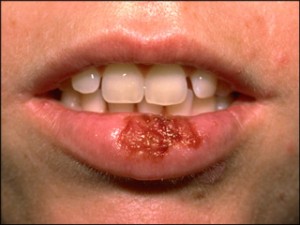 Many people assume that look-alike over-the-counter (OTC) medicines contain the same active ingredients as the more expensive brand name products. But that’s not always the case. Take lip medicines for example – many of their labels suggest that they treat cold sores (caused by the herpes simplex virus), but only one active ingredient has been proven to work. Docosanol is the active ingredient in Abreva, and has been approved by the FDA to shorten the duration as well as prevent the outbreak of cold sores (an estimated 20-40% of Americans are afflicted by cold sores).
Many people assume that look-alike over-the-counter (OTC) medicines contain the same active ingredients as the more expensive brand name products. But that’s not always the case. Take lip medicines for example – many of their labels suggest that they treat cold sores (caused by the herpes simplex virus), but only one active ingredient has been proven to work. Docosanol is the active ingredient in Abreva, and has been approved by the FDA to shorten the duration as well as prevent the outbreak of cold sores (an estimated 20-40% of Americans are afflicted by cold sores).
In a recent survey (sponsored by Abreva), 66% of respondents said they believed that “look-alike” medications contained the same active ingredients as the brands that they were copying, and 93% said they purchased look-alikes solely because they were less expensive.
Unfortunately, you get what you pay for in this case. Even though the FDA may send out warning letters to manufacturers of look-alike products who print false healing claims on their packaging, those products often remain on store shelves. The manufacturer of Abreva (Glaxo Smith Kline) notes in a press release:
Several “look-alike” cold sore treatments tout healing claims, but contain the ingredient Benzalkonium Chloride instead of docosonal. The FDA recently issued a warning letter to a marketer and distributor of a product containing benzalkonium chloride that is making the claim on its product’s label that it heals cold sores. The FDA found that the active ingredient, benzalkonium chloride, is not indicated as a cold sore treatment and may not make cold sore healing claims because there is no scientific evidence to support claims that it heals cold sores.
Evidence suggests that Abreva shortens the duration of cold sores by about 18 hours, and may slightly reduce the risk of outbreak if the medicine is used at the first sign of pain or tingling. Whether that’s worth the price of the treatment is up to the consumer, but choosing a cheaper product with a different active ingredient is likely to be a waste of money.
The Abreva case serves as a reminder to check the active ingredients in your OTC medicines before purchasing what seems to be a cheaper, equivalent medicine. While generics are often a smart way to save money on effective medicines, look-alike medicines can sometimes be hiding fake cures in a convincing little package. Let the buyer beware!
July 9th, 2012 by Dr. Val Jones in Book Reviews, Health Tips
1 Comment »
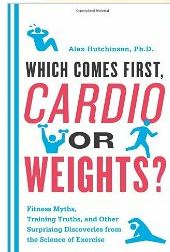 I just finished reading a great little book called, “Which Comes First, Cardio Or Weights? Fitness Myths, Training Truths, And Other Surprising Discoveries From The Science Of Exercise” by Alex Hutchinson, Ph.D. I’m very grateful to Alex for patiently sifting through over 400 research studies in a quest to answer (with evidence, not subjective opinion) some of our most nagging exercise questions.
I just finished reading a great little book called, “Which Comes First, Cardio Or Weights? Fitness Myths, Training Truths, And Other Surprising Discoveries From The Science Of Exercise” by Alex Hutchinson, Ph.D. I’m very grateful to Alex for patiently sifting through over 400 research studies in a quest to answer (with evidence, not subjective opinion) some of our most nagging exercise questions.
Alex is the perfect guy to do this exercise myth-busting as he is a competitive runner, professional journalist, and has a Ph.D. in physics. His writing is crisp, uncluttered, and bears the understated humor of a Canadian. To be honest, I enjoyed his book so much that I was contemplating blogging about most of his conclusions. However, I don’t want to teeter on the edge of copyright infringement, so I’ll just provide you with some highlights from my favorite sections of the book:
1. Do compression garments help you exercise? I’ve wondered this many times as I jiggled my way down the road on a long run. I’ve always liked the theory behind tight outer-garments, that they reduce unnecessary movement during running, thus making one’s movement more efficient and reducing the bounce and drag on muscles and skin. They may also help with blood return to the heart and reduction in peripheral edema, speeding recovery from exercise. Believing the plausibility of the argument, I have indeed sprung for some rather expensive running tights.
So what does the scientific literature have to say about compression garments’ role in exercise? Apparently there is nothing conclusive yet. Small studies have shown no clear improvement in exercise economy, athletic power or endurance, or recovery from exercise. The only measurable benefits appear to have occurred in those who believed that the compression garments would help their performance. A nice reminder of the importance of the “mind-body” connection in athletic pursuits. Bottom line: if you like how you feel in compression garments, by all means wear them. But don’t expect any dramatic improvements in anything more than your jiggle factor.
2. Will sitting too long at work counteract all my fitness gains? The short answer to this question is: possibly. I was surprised to note that at least one large study found that sitting for more than six hours per day increased one’s risk of death by 18-37% regardless of how much exercise one performed in the other eighteen hours of the day. Long periods of sitting appear to be quite bad for your health, so getting up and moving around every hour or more is important if you have a sedentary job or lifestyle.
3. Does listening to music or watching TV help or hurt my workout? Listening to faster-tempo music can result in increased exercise effort (in many cases completely unconsciously), while TV-watching usually results in a reduced exercise effort. This is because watching videos requires visual attention and subtle changes in balance and movement occur to accomplish it.
4. Will stretching help me avoid injuries? As a person with limited flexibility, I found this section of the book to be quite comforting. As I have blogged previously, stretching has not been shown to reduce the risk of injury or post-exercise soreness. In fact, it can decrease power and speed for certain athletes, though it is important for those who intend to perform great feats of flexibility (such as gymnastics).
5. Should I take pain killers for post-workout soreness? Interestingly, non-steroidal anti-inflammatory drugs (NSAIDs) are not particularly effective in reducing post-exercise pain and can even interfere with muscle repair. NSAIDs block prostaglandins, which are important in collagen synthesis. While NSAIDs are useful in reducing inflammation and swelling in acute injuries (such as an ankle sprain), general muscle soreness isn’t a good reason to pop some ibuprofen.
6. Will drinking coffee help or hinder my performance? I’m one of the few people I know who doesn’t drink coffee, so I was surprised to discover that I may have been missing out on an important exercise enhancer. According to decades of research, caffeine is likely to improve your exercise performance. Studies have shown that pure caffeine (not necessarily in its coffee form) enhances sprint performance as well as endurance activities up to two hours. In 2004 the World Anti-Doping Agency removed caffeine from its list of restricted substances, so expect to see some caffeinated athletes in this summer’s Olympics.
7. What’s the best way to breathe during exercise? If you’ve ever marveled at your own panting, you’ve also probably wondered if there is a more efficient way to breathe – or at least a less embarrassing way. The answer is no. Studies have shown that people who consciously work to make their breathing less labored expend more energy and get less oxygen in the process. So, keep on breathing the way your body wants to… you’re naturally more efficient at it than you think.
I hope that these little tidbits have whet your appetite for more of Alex’s excellent insights. I have fully equipped myself with fast-paced music and a little caffeine, as I move my inflexible, jiggly, panting self down the road on another long run.
July 5th, 2012 by Dr. Val Jones in Health Tips, Humor, Opinion
5 Comments »
-
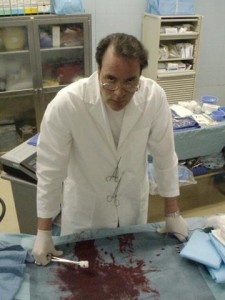
- A Typical Jerk, M.D.
Editor’s Note: This post is meant to be tongue-in-cheek. We sincerely hope that our colleagues are not offended by the use of the term “jerk” to describe physician behavior. If you are a jerk, please feel free to leave a nasty complaint in the comment section of this post. Thank you!
Physicians have a reputation for being, to put it bluntly, jerks. It took me a long time to accept the fact that we are (on average) a disagreeable bunch, and my years of denying that there is a problem has finally given way to acceptance and even some degree of tolerance of “assholitry.” Few of us doctors think that we’re the one with the attitude problem, but I’m afraid that even the sweetest pediatrician can show some mighty claws when backed into a corner.
I didn’t think that I was a jerk until a few days ago when a surgeon made a medical error in the care of my loved one. I won’t go into details here, but let’s just say that evisceration was on the menu. My family member overheard one of the conversations and commented timidly, “I think you’ve probably just successfully alienated yourself from the entire medical community at Hospital X.” Yes, I was a total fire-breathing monster.
But this got me thinking – maybe if I explained all the reasons why doctors have bad attitudes, there would be a little more grace shown to us? Maybe our patients would be less offended and more understanding of our dispositions? I suspect that most people feel that there is “no excuse for rudeness” but I’ll offer a few nonetheless and see if I can’t change your mind. Here are the primary reasons that doctors are jerks:
1. We are afraid.
Being responsible for sick peoples’ lives is a scary thing. There are so many variables outside our control, and yet we believe that we must control the outcomes at all costs. It’s as if doctors somehow absorb the false belief that we can cheat death, and so when our patients don’t experience the optimal outcome from our every action and decision, we engage in some serious self-flagellation or (for those who possess a higher jerk index) we kick the proverbial dog (i.e. you).
Fear of inadvertent medical errors is a real butt-clencher for many doctors, and as science provides us with more insight into disease management we must be ready to do things differently, and to relearn everything we were taught. Keeping abreast of all these changes is very hard work, as there are over 6000 new research studies published world-wide each day. Our fear of failing to know everything we “should” causes many of us to hide behind a veil of toughness. Arrogance is often just a cover for vulnerability, and with so much information that we’re expected to digest, we are at risk for making a bad decision if we aren’t up to date. And when a doctor makes an error, he or she can pay a high penalty, including public humiliation by her peers, loss of her medical license, livelihood, the pain and suffering of legal action, and even confiscation of personal assets and savings.
And then there’s the daily fear of “fire-breathing monsters” like me. At any turn, irate family members, colleagues, hospital administrators, and staff can swoop in and criticize your best efforts.
2. We are hen-pecked.

- A Physician With Three Hospital Administrators
The constant juxtaposition of trivial and critical can make doctors seem dismissive and arrogant. This is a subtle point, but one that is really important to understand a physician’s mental state. Imagine that you’re tending to a dying man with a gunshot wound to the chest, and a hospital administrator taps you on the shoulder to ask if you could fill out a form about insurance coding. You would view that request as particularly annoying given the context in which it occurred, right?
This may be an extreme example, but similar scenarios play out in our work days constantly. We are frequently interrupted (in the midst of very grave conversations, for example) with requests for approval of Tylenol orders, coding clarifications for duplicate insurance documents, or updates of no apparent consequence (such as, “Dr. Jones, I just wanted you to know that Mrs. Smith did receive your Tylenol order.”)
The very act of doctoring can make us feel as if we’re undergoing harassment by the hopelessly inane, punctuated by terrifying bouts of near-death scenarios accompanied by the usual fire-breathing monsters. If that job doesn’t turn you into a jerk, then… you probably are a robot.
3. We are exhausted.
Sleep deprivation is a well-known form of torture used by interrogators to extract information from “evil-doers.” It is also used by residency programs to keep whining residents from having the energy to complain effectively or to organize their efforts against their torturers. Then once these doctors-in-training accept chronic sleep deprivation as the new-normal, they carry an expectation of it throughout the rest of their careers. Of course, sleep-deprived people are more likely to be irritable, short-tempered, impulsive, grandiose, and hostile – aka jerks.
4. We were probably jerks to begin with.
Getting into medical school is extremely competitive. Only the very top students make it, and they are generally ranked according to science test scores (not compassion scores or charming personality scores). Successful pre-meds are generally type A personalities with a fierce competitive nature. And what kind of person would sign up for a career where they are harassed, blamed, required to do endless paperwork of indeterminate usefulness, denied regular sleep, and endure hostility from staff, coworkers, family members, and error-prone colleagues? A person with a pretty thick skin and a high tolerance for sadism and/or masochism… also known as a jerk. So, for the few doctors who don’t enter medical school as fully formed jerks already (let’s say they didn’t realize what they were getting into), the work they do will thicken their skin eventually, creating jerk-like personality traits in the end.
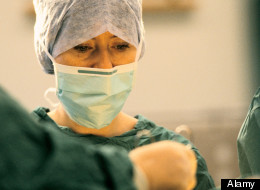
- A High Jerk Index Surgeon
Is there a jerk scale in medicine? Who are the biggest jerks? Yes, all doctors exist somewhere on the jerk continuum, and you can roughly guess where they’ll be depending upon how likely that an encounter with them will end in your demise. Trauma surgeons, cardio-thoracic surgeons, and neurosurgeons have the strongest jerk traits, while pediatricians, physiatrists, and family physicians are probably on the other end of that scale. There are some exceptions, of course, but actually not many.
What can you do to make the best of having to work with a jerk? At some point, you or a loved one will need medical care (no one gets out of this life alive) so you will probably have to deal with some serious jerks along the way. Knowing that this is in your future, you should probably start planning how you will handle this now. I offer you my do’s and don’ts of jerk management, or how best to ally with your physician:
Don’t:
1. Bring your doctor more trivia. Jerks have a low tolerance for irrelevant details, largely because they are tortured by it daily (such as pages of EMR-generated duplicates of physical exam findings from interns). Think about what you really want to talk about with your doctor and don’t get side tracked with your own personal “hot flash tracker” data or other tangential story that is unrelated to your current problem.
2. Threaten your doctor with legal action or allusions to your “friend the lawyer.” The jerk you’re talking to is already frightened enough about frivolous law suits. If you tap into that fear he or she will just go into self-protection mode and probably harm you with excessive and unnecessary tests, consults, and referrals. Or even worse, maybe they’ll hide information from you.
3. Attack your doctor’s judgment directly. This is a tricky one because your doctor won’t always make the best clinical decision in your case, and you have the right to point that out. The best strategy for getting your way (assuming that you’ve found a true error) is to be friendly about it. Use the Socratic method if you can so that they’ll think they discovered the mistake themselves.
4. Fight fire with fire. You would think that you could get some respect from a jerk by being just as nasty to them as they are to you – and that strategy may work with playground bullies – but unfortunately that rarely helps in medical culture. More likely the physician will become quiet and simply resolve to stonewall you and be extra unhelpful in processing your care needs. You don’t need that.
Do:
1. Be prepared for your visit. Bring a list of your medications, relevant medical history and test results. Write down your questions in advance. Anticipate the questions that your doctor will ask you (if you can) and be ready with focused answers. You will look like a super-star and your doctor will be indebted to you.
2. Be understanding of our lateness. I know it drives you crazy and you feel disrespected by your doctor. But know that lateness can be caused by many things, including ill-prepared patients, really sick people, emergency surgery and golf games. If your doctor is a major jerk and the cause of his/her lateness is golf-related, then at least YOU will feel better if you presume he/she was delayed by a real emergency.
3. Be a “compliant” patient. Once you and your doctor decide upon a care or treatment plan that is right for you, try to stick with it. It’s in your best interest to do so and your doctor will love you for it. Sure, if he’s a big jerk he’ll only love you because your good outcomes make his performance measures (and payment structure) increase, but if he has a conscience he’ll also be genuinely pleased that you’re well.
4. Find another doctor if you need to. Although this isn’t always an option for folks in rural areas, if your doctor is impossible to work with, then you should find someone else to take care of you. Be very polite, get copies of all your medical records, and then take them elsewhere. Don’t be stoic and stick with a total jerk if your care is being compromised by his or her attitude and behavior.
So there you have it. When you have your next unsatisfactory encounter with me or one of my colleagues, please consider that there are some good reasons for our irritability. But being a jerk isn’t always a bad thing, because if your loved one needs a medical champion, then a fire-breathing monster is probably an excellent advocate. You can harness a monster for your purposes if you follow the do’s and don’ts of physician relationship management. I wish you luck with your future encounters with us!
June 29th, 2012 by Dr. Val Jones in Health Tips, True Stories
No Comments »
 A friend of mine had a bad reaction to a heart medicine, dropping her blood pressure to as low as 76/49 as a result. She was feeling understandably dizzy but didn’t want to go to the ER so she asked me if there was anything she could do at home to help raise her blood pressure. I recommended that she drink a large volume of water and take some salt tablets. She had no salt in pill form, and didn’t want to take it straight out of the shaker so asked if there was any other way to get the salt in. I asked her to describe the contents of her refrigerator and pantry, and made a mental note of what I thought had the highest salt content.
A friend of mine had a bad reaction to a heart medicine, dropping her blood pressure to as low as 76/49 as a result. She was feeling understandably dizzy but didn’t want to go to the ER so she asked me if there was anything she could do at home to help raise her blood pressure. I recommended that she drink a large volume of water and take some salt tablets. She had no salt in pill form, and didn’t want to take it straight out of the shaker so asked if there was any other way to get the salt in. I asked her to describe the contents of her refrigerator and pantry, and made a mental note of what I thought had the highest salt content.
My friend thought that potato chips might do the trick, and was surprised when I told her that she had something almost ten times saltier at her disposal. Four ounces of prosciutto contained almost 2g of sodium, an entire day’s worth of salt! So she dutifully consumed the sliced meat, washing it down with about a liter of water. Two hours later she was back up to 98/66 and six hours later her blood pressure had returned to a healthy 116/83.
This was a rare case where a “high salt diet” had its benefits. In the case of ham versus hypotension, ham won… and saved my friend a costly, and unnecessary ER visit. Let’s hear it for deli meat!
June 27th, 2012 by Dr. Val Jones in Health Tips, Opinion, Research
1 Comment »
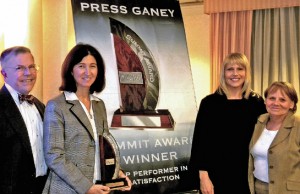 One would think that happiness and healing are inextricably linked in healthcare, but the Happy Hospitalist (HH) raises an interesting question: is modern medicine’s emphasis on patient satisfaction (and shared decision-making) sacrificing our quality of care? A recent study found that patients who preferred their physicians to take the lead in their medical decision-making had shorter, less costly hospital stays.
One would think that happiness and healing are inextricably linked in healthcare, but the Happy Hospitalist (HH) raises an interesting question: is modern medicine’s emphasis on patient satisfaction (and shared decision-making) sacrificing our quality of care? A recent study found that patients who preferred their physicians to take the lead in their medical decision-making had shorter, less costly hospital stays.
HH argues that if physicians are expected to perform like airline pilots, reliably choosing/performing the best course of action for those depending on them, then patients should behave like passengers. In other words, passengers don’t tell the pilot how to fly the plane, nor should patients override a physician’s clinical judgment with personal preferences.
I think this analogy misses the mark because patients are rarely interested in making decisions about how a physician accomplishes her task, but rather which tasks she undertakes. Flight passengers aren’t interested in quibbling about the timing of landing gear, they are interested in the selection of their destination city. And so they should be.
While there may be a correlation between physician-led decision-making and shorter hospital stays, I’m not convinced that this translates to improved care quality. For the study subjects, discharge could have been delayed because the “empowered” patients insisted on ensuring that a home care plan was in place before they left the hospital. Or perhaps they wanted to get their prescriptions filled before going home (knowing that they couldn’t get to their home pharmacy over the weekend)? The study did not assess whether or not the discharge delays reduced readmission rates, nor did it seek to determine the cause of prolonged stays. This study alone is insufficient to draw any conclusions about the relative value of the patient empowerment movement on health outcomes.
While I certainly empathize with HH about the excessive focus on patient satisfaction surveys over true quality care, I strongly believe that an educated, participatory patient is our best ally in the practice of good medicine. There are simply too many cogs and wheels turning at once in the healthcare system to be able to ensure that the right care is provided at the right time, every time. We need all the help we can get to monitor our care plans in order to avoid medical errors, compliance problems and missed opportunities.
If you see something, say something. That principle applies to healthcare as much as it does to flight safety.
 Many people assume that look-alike over-the-counter (OTC) medicines contain the same active ingredients as the more expensive brand name products. But that’s not always the case. Take lip medicines for example – many of their labels suggest that they treat cold sores (caused by the herpes simplex virus), but only one active ingredient has been proven to work. Docosanol is the active ingredient in Abreva, and has been approved by the FDA to shorten the duration as well as prevent the outbreak of cold sores (an estimated 20-40% of Americans are afflicted by cold sores).
Many people assume that look-alike over-the-counter (OTC) medicines contain the same active ingredients as the more expensive brand name products. But that’s not always the case. Take lip medicines for example – many of their labels suggest that they treat cold sores (caused by the herpes simplex virus), but only one active ingredient has been proven to work. Docosanol is the active ingredient in Abreva, and has been approved by the FDA to shorten the duration as well as prevent the outbreak of cold sores (an estimated 20-40% of Americans are afflicted by cold sores).

 I just finished reading a great little book called, “
I just finished reading a great little book called, “


 A friend of mine had a bad reaction to a heart medicine, dropping her blood pressure to as low as 76/49 as a result. She was feeling understandably dizzy but didn’t want to go to the ER so she asked me if there was anything she could do at home to help raise her blood pressure. I recommended that she drink a large volume of water and take some salt tablets. She had no salt in pill form, and didn’t want to take it straight out of the shaker so asked if there was any other way to get the salt in. I asked her to describe the contents of her refrigerator and pantry, and made a mental note of what I thought had the highest salt content.
A friend of mine had a bad reaction to a heart medicine, dropping her blood pressure to as low as 76/49 as a result. She was feeling understandably dizzy but didn’t want to go to the ER so she asked me if there was anything she could do at home to help raise her blood pressure. I recommended that she drink a large volume of water and take some salt tablets. She had no salt in pill form, and didn’t want to take it straight out of the shaker so asked if there was any other way to get the salt in. I asked her to describe the contents of her refrigerator and pantry, and made a mental note of what I thought had the highest salt content. One would think that happiness and healing are inextricably linked in healthcare, but the
One would think that happiness and healing are inextricably linked in healthcare, but the 







